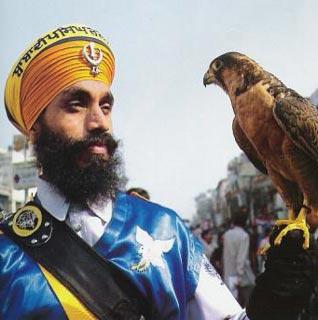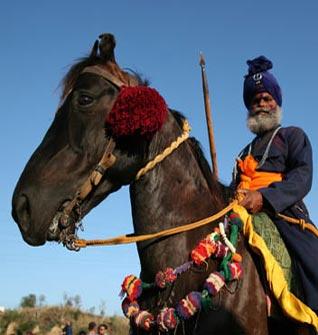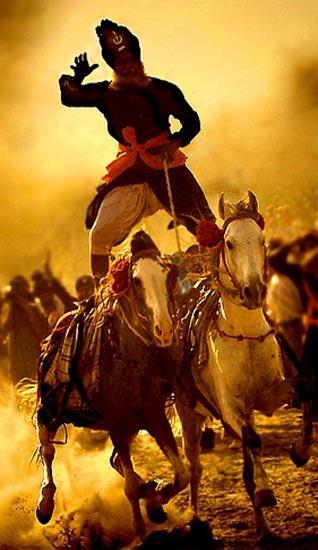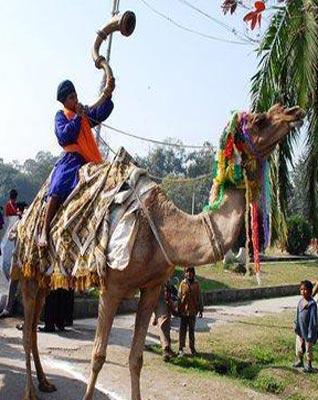History
Thundering Words: The Martial Language of Nihangs
NIHANGSINGH.ORG
Like many nomadic communities, the Nihang Singhs have through the centuries developed a distinguishable dialect. This language is historically known as GarrGaj Bole ('The Thundering Language') of the Khalsa.
It combines a mixture of Punjabi, Hindi, Persian and other dialects used in the various regions of Punjab.
Bolay, words which form part of the Nihang dialect, historically served militaristic and psychological purposes.
Svaiyyai, or poetic verses, is the genre they use as a means of preserving oral history or traditions, which Bhai Rattan Singh Bhangu took great effort to preserve in his monumental study, Pracchin Panth Parkash.
Finally, Jaikaray are
battles cries which are raised by Nihang Singhs in order to draw
strength from Akal Purakh ('The Timeless Being') and to strike fear in the enemy.
Vocabulary
A bola literally means a saying; bolay are the sayings of Nihang Singhs
which in recent years have even become popular in common Punjabi
culture. Often an item is called by the characteristics it possesses or
the effect that it has.
For example, a chilli is called ‘larraaki' which refers to someone with a fighting nature, as a result of the sting it leaves on one's tongue.
A fever or illness which causes weakening is referred to as Aakarhpun - arrogance.
A staff or wooden stick is called Ukuldan - one which bestows wisdom, referring to the beating which it delivers someone who won't behave.
In many ways, the language of the Nihang Singhs sheds light on the
difficult times which they have gone through and illustrates how they
maintain their high spirits - Chardi Kalaa - through tough and easy times. They
essentially developed a distinct idiom to describe ordinary and dull
things in life, or make the most out of dire conditions. This is
illustrated by the luxurious titles given to even the basic necessities needed for
survival which have not always been available to Nihangs, an example
being the term ‘Mithaa Parshada', literally meaning sweet blessed food, which
actually refers to the leftover roti which is a day or more old.
The bolay also reflect the military struggles of the Khalsa. Those who
have opposed the Sikhs at any stage in history find themselves somewhat
ridiculed in the Nihang dialect. The term for a donkey is ‘Thaanedar',
literally meaning a police officer, as Nihangs are renowned for their carefree
disregard for the worldly authorities which the police represent.
Muslim
priests (Qazis) encouraged many atrocities on the Sikhs during the
Mughal Rule of India. In return, the Nihang Singhs use the term Qazi when
referring to a cockerel.
Some bolay also serve a military and defence purpose. Nihang Singhs refer
to their kachherey (briefs) as a chhawni, meaning encampment. The Nihang
Singh's kachhera is notoriously large in size and from a distance
would appear to enemy scouts as a tents of the Khalsa warrior; suggesting
the Khalsa warriors numbered far greater then they did.
Furthermore, each Nihang Singh fashions himself alone to be ‘savaa lakh' or equal to 125,000 warriors; thus enemy spies are never able to evaluate the numbers of the Khalsa army as from every quarter they would hear different numbers.
Nihang Singhs also refer to milk as samundar (ocean). Hearing of Nihang claims of drinking the ocean would strike fear into the enemy ranks long before they ever encountered the Khalsa on the battlefield.
Such psychological tactics
have always been used by the Khalsa. Nihang Darshan Singh states:
‘Guru Gobind Singh would rename some of the smaller or weaker
Singhs in the ranks of the Khalsa army. He would bestow them with
lofty titles such as ‘Dharti-Hallaa Singh' (literally, the Earth-shaker). This would not
only send fear and doubt deep within the ranks of the enemy soldiers,
but encouraged the Singhs in the Khalsa army to fight heroically with
courage and confidence and honour the names given to them by the Guru'.
[Audio recording, July 2006]
A selection of Nihang Singh bolay and the object which they refer to in English are listed below:
|
Aakarrpun Arring Brring Badam Basant Kaur Bata Bateray Billa Birajkay Bhuhhangi Choona Chugal Chup DC Dhullay Garday Gobinday Gobindyia Gurh Heeray Hulla Jaan Bhai Jhatanga Jahaj Kulga Kastoora Kesar Laraki Mamla Mastana Mitha Parshad Morcha Nihal Kaur Parsram Patwaree Pathan Siri Bhootni Qazi Rupa Samundar Sarb Ras Siropa Sukha Subedar Tehsildar Thanedar Theekar Tid Fookni Dhokhay Baaj Vaheer |
Body illness (Arrogance) Lying down (Wrestling) Chick peas (Almonds) Corn (Spring Damsel) Iron bowl Aubergine (Partridge) Englishman (Cat) Seated (Holding Court) Son (Snake) Flour (Lime-stone powder) Mirror(Back-biter, tattler) Sugar (Silence) Limper Meat Rice Watermelon Carrots Jaggery White hair (pearls) Hurry (Blast of the East Wind) Horse (Blood brother) Goat Cart (Ship) Baldy Pig (Musk) Tumeric (Saffron) Chilli (Shrew) Money (Revenue) Care free/ empty Chapati (Sweet Sacrament) Endeavour (Assault on the enemy) Blanket (A Satisfying Woman) Axe Cat (Tax-collector) Cauliflour(Afghan soldier) Train (Witch) Cockerel (Muslim cleric) Onion (Silver) Milk (Ocean) Salt (The Essence of Life) Beating (Robe of Honour) Cannabis (Pleasurable) Sweeper (Police Sergeant) Intelligent Donkey (Police Constable) Body (Shell) Tea (Stomach Destroyer) Spoon (Imposter) Mobile camp |
Note to Readers: If you know other bolay of note, or better translations for any of those listed above, please share the same below in the COMMENT section. Thank you.
October 21, 2010
Conversation about this article
1: Karam Singh Lamba (Ahmedabad, India), October 21, 2010, 11:55 AM.
An eye-opening article on a group on the verge of disappearing.
2: Sangat Singh (Kuala Lumpur, Malaysia), October 21, 2010, 3:22 PM.
The Nihang Singhs were the image of spotless character: "boohaa khol(h) de nisang, aae nee nihang." - 'Open the door, do not be afraid, a Nihang has come your house.' They used to lead such an intrepid and unpredictable lifestyle that even their families did not know of their whereabouts. While riding or fighting battles, they always yelled "Akaal! Akaal!" That is why they also came to be known as Akaalis. Their language (the distinct language of the Khalsa) indicated their positive (chardi kalaa) attitude. For example: To die = Charhaaee karnaa (Conquer the Enemy's post). Sickness = Dharam Raaj di dhee seva kar rehee hai (being attended by the daughter of the Angel of Death). Punishment to the guilty = Shaheedi maar (a martyr's beating). Chickpeas = Badaam. Salt = Sarab rass. A little = Sawaayaa (One and a quarter). When there is nothing/ run out - Mast (Happy). Grass = Haraa pallaa (Green rice). Shanty = Sheesh Mahal (Palace of Mirrors). Calamity - Swarag (Heaven). Worn out scarf - Hazaar mekhee. Coarse grain = Gurmukhi Parshaad. Rupees = Chhillar (bark of a tree). Someone loose on Sikh conduct = Dabrroo Ghusrooh. One = Savaa lakh (a hundred and twenty-five thousand). Sleep - Dharam Raaj di dhee (Daughter of the Angel of Death). Oneself = Fauj (an army). Apologies for any duplication.
3: Inderpreet Singh (Chelmsford, MA, U.S.A.), October 22, 2010, 10:20 AM.
I usually do a fun lesson at Camp Chardi Kala (New York) and at Sidak (San Antonio, texas) regarding this subject every year. Principal Teja Singh calls this the "Vocabulary of Heroes" in his essay, "Humour in Sikhism". Allow me to quote the pertinent paragraph: "As a result of this brave spirit, there grew up among the Sikhs a peculiar slang, which was called the Vocabulary of Heroes. In it, the things connected with difficulties of life were expressed in terms of such cheerfulness and bravado, as if for the Sikhs pain and suffering had lost all meaning. Death was familiarly called an expedition of the Khalsa into the next world. A man with an empty stomach would call himself mad with prosperity. Grams were almonds, and onions were silver pieces, while rupees were nothing but empty crusts. A blind man was called a wide-awake hero, and a half-blind man an argus-eyed lion. A deaf man was said to be a man in the upper storey. A baptised Sikh was called a Brother of the Golden Cup, which, by the way, was only an iron vessel. To be fined by the community for some fault was called getting one's salary. The big stick was called a lawyer or the store of wisdom; and to speak was to roar." Sirdar Kapur Singh has some examples of this vocabulary of heroes in his writings too. But by far the most extensive dictionary of Khalsa Bol that I have come across is available in the Mahaa(n) Kosh (Encyclopadia) by Bhai Kahn Singh of Nabha. Look it up and enjoy!
4: Jasninder Singh (United States), February 19, 2018, 11:43 PM.
Jutti (slippers) is Ghorrhey (horses) in Nihang lingo.






